- Home
- Holly Black
Welcome to Bordertown Page 2
Welcome to Bordertown Read online
Page 2
LIFE ON THE BORDER
Misinformation about Bordertown is rife in both the World and the Realm, so here’s a quick history lesson from The Tough Guide to Bordertown (with commentary by us):
The city takes its name from the Border itself, a magical wall that divides the human World from the enchanted lands beyond: a place that humans call Elfland, populated by a tall, silver-haired, long-lived race of people that humans call elves. They, on the other hand, refer to themselves as Truebloods, and to their homeland simply as the Realm. (Humans, take note: You can refer to the Realm as “Faerie” without causing offense, but do not make the mistake of referring to its citizens as “fairies”—unless you want to be punched.)
Elfhaeme Gate is the only point of passage across the Border, controlled by officers of the Realm. Passage is for those of elfin blood only; no human is ever allowed to cross the Border. Humans have no idea what really lies on the other side, and the elves themselves aren’t telling. In fact, they can’t tell: there are powerful magics that prevent them from talking about the Realm except in ways designed to obscure the truth. (So don’t ask them, unless you want to embarrass yourself and them, no matter how much you long to know.)
Bordertown is located in the Borderlands (aka the Nevernever) between Elfland and the World, where it grew out of the ruins of a human city abandoned when Elfland first appeared. Populated by both elves and humans, Bordertown is a famously uncomfortable place to live. Elfin magic is wildly unpredictable here, as are human science and technology, and the city runs on a volatile combination of the two. (If you want to power your electric amp or your iPhone, you’re going to need to find a spellbox. And even then, you might get strange results.)
With an economy based on elfin–human trade, much of the city is now reasonably stable—except for the Soho district (south of Ho Street, enclosed within the Old City Wall), which has become a well-known mecca for runaway kids, both human and elfin. This derelict neighborhood remained abandoned for many years until young people began to claim it for their own, squatting in the ruined, graffiti-covered buildings and bringing them back to life. (Yes, kiddies, it’s true. Soho belongs to us.)
Okay, so you’ve found your way to Bordertown. That was probably hard, so hooray for you. But please, dear noobs, don’t be naive: life here isn’t easy, and you must keep your wits about you. Gangs control many parts of the Old City; the Border drug trade is run from here; and there are even worse things to contend with when Border magic blows in the wrong direction. If you’re human, don’t drink the red Mad River water—it’s addictive and will turn your brain to mush. If you’re Trueblood, it’s catnip you must avoid. (We’re not kidding.) Be smart, be careful, be safe.
ARRIVING IN BORDERTOWN
The Diggers operate three safe houses (for short-term stays) on Water, Plum, and Carmine Streets. No cash required, but you’ll be expected to follow the Digger House Rules, strictly enforced: no weapons, no drugs, no gangs, and everyone helps to clean and cook.
Once you’ve decided whether or not it was a huge mistake to come here after all, look for a longer-term squat or rental on the message board at the Poop (in front of Café Cubana). The bulletin board in the back hall of The Dancing Ferret (the famous music club on Carnival Street) is another good source of housing information, as well as up-to-the-minute info on Soho nightlife and the Border Arts scene. While you’re at The Ferret, be sure to tell the owner, Farrel Din, that you’re new in town. The first beer is, by tradition, on the house.
THE WEEKLY ADVISORY
As you know if you got here recently, the Way between the World and Bordertown was impossible to find for a while and only recently reopened. From the World’s point of view, the Borderlands vanished entirely for thirteen years—but here on the Border, those thirteen years have been only thirteen days. A support group has been formed for people whose lives have been affected by the thirteen-year Gap (details available at Elsewhere Books).
All the usual gang treaties are in force this week. Ho, Carnival, and Carmine Streets are Neutral Territory, strictly enforced. All gang areas are restricted to their traditional boundaries (get a map at the Poop if you don’t know what these are), except for the alleys running from Chrystoble Street to the Carnival Place mews, currently under dispute by the Rune Lords and the Pack. Avoid them.
Lankin activity has been reported on the east end of Birch Street, pickpockets at Tumbledown Park, and the Rowan Gentleman was (supposedly) spotted in Riverside and Whisthound Square. There have been four monster sightings this week (three unconfirmed, one confirmed but harmless), and the gargoyle at the top of the Mock Avenue Bell Tower has mysteriously vanished.
Ho Street will be closed to traffic on Saturday for the annual Jou’vert parade; Green Lady Lane will be closed on Sunday for the Dogtown Benefit Blues Bash (cash donations or dog chow required for entry); and Onion Street has been closed for the last three weeks for no apparent reason. The Mock Avenue street association would like to apologize to everyone for fixing the church tower clock last week, which caused widespread confusion. It has now been restored to its usual wrong time.
Border Magic fluctuations have been brisk in the last ten days, with a predicted drop by Sunday. The cloudy weather continues, with sunny patches in the week ahead and Border storms to follow. Watch out for Mad River flooding, lightning strikes in the Nevernever, and windblown spells.
Welcome to Bordertown, boys and girls and Gentle Folk. We hope you enjoy your stay.
1. The original Diggers were a radical Protestant group in seventeenth-century England who practiced a communal, agrarian lifestyle and did not believe in private property. The name was revived by communal groups in the United States and Canada in the 1960s, and then in Bordertown some decades later. The Bordertown Digger community is a multifaith, multiracial group dedicated to helping runaway kids, homeless folks, recovering addicts, and others in need of friendship, food, and a place to sleep.
WELCOME TO BORDERTOWN
BY ELLEN KUSHNER AND TERRI WINDLING
Milltown, in the present day …
The postcard came three days ago. On one side is a picture of some building and the words “Welcome to Bordertown”; on the other side is a message from my sister, writing to tell us that she’s safe and doing fine. The date on the card is thirteen years old—but the postmark says it was mailed in Boston last week. Mom practically fainted when she found it in our mailbox, and now she won’t talk about it at all.
The rest of the family is talking, though. Uncle Bud thinks the card is a practical joke from some sicko who’d heard about Trish’s disappearance, maybe read it in the papers thirteen years back. Uncle Harry’s theory is that Trish did write it, before Whatever Happened to Her happened, and then the card got lost in the mail for thirteen years. Uncle Al thinks that Trish must have been in Boston all this time, probably hooked on drugs, or worse, and too ashamed to let the family know. (It was at this point that Mom left the room and refused to discuss it any further.) As for me, I’ve got a theory of my own, although I know better than to say it out loud. As soon as I saw the postcard, I knew: Trish had really made it to Bordertown.
It was, after all, where she’d said she was going in the note she’d left behind for Mom and Dad—although she might as well have said she was going to Mars or Oz for all that anyone believed it. I believed it. I was only six years old, but she’d taken me into her confidence. “There’s a place called the Borderlands,” she’d told me, “where magic is actually real, Jimmy, and elves live alongside mortal men, and everything is beautiful. They don’t have cars and televisions, or factories and shopping malls. And no one thinks it’s weird to love old books there and to want more out of life than this.”
I was sitting on the bed in her little attic room, watching glumly as she filled her knapsack with clothes and books and chocolate bars. She finished her packing, buckled up the straps, and came over to sit on the bed beside me.
“I still love you, Jimbo,” she tried to reas
sure me. “And Mom and Dad and the uncles and everybody.”
“What about Rosco?” I asked her miserably. “He’s only a puppy. He won’t understand.”
Trish put an arm around my shoulders. “I need you to look after Rosco now, Jimmy. And Mom and Dad. Will you do that? Promise?”
I nodded slowly … and it seems to me now that my childhood ended with that solemn vow. I keep my promises. Unlike Trish.
“Don’t worry, cuddlebunny,” she said. “I’ll write. And I’ll be home for Christmas.”
She didn’t write. She didn’t come home. For thirteen years, my sister has been just a smiling photograph sitting on the mantel—while my parents stopped smiling at much of anything at all. The family went on. That’s all. We went on—ignoring the empty, aching space where my smart, funny, beautiful sister used to be. The dog grew older. The folks grew older. I kept my word and looked after everybody: the quiet son, the reliable son, the child who would never up and leave. The son who’s never done anything unpredictable his entire life. Until now.
I’m going to Bordertown.
I’m going to find Trish, and then I’m going to bring her home.
* * *
Bordertown, thirteen years earlier by the World’s time, thirteen days by Border time …
Trish stuck the postcard between the pages of The Book of Three, the only paperback she’d brought from home, in her knapsack along with two changes of underwear, some warm socks, her pen with the purple ink, plus The Golden Book of Fairy Tales and A Treasury of Verse. She kept them with her at all times, because nothing was really safe at the squat. Stuff disappeared. She’d been there only two weeks, but already she knew that much about life in Bordertown.
Trish bit back tears. If this had been her first week of college, the way she’d planned, then she’d have a roommate—probably some snotty preppy kid, sure, but they’d be in a dorm with lots of other girls who studied hard and wanted to talk about poetry and history as they walked across campus carrying their books past redbrick buildings covered in ivy.
And instead here she was, begging a girl (whose real name couldn’t possibly be Thelma Louise Mankiller!) to hurry up and let her use the only sink with running water in the squat they all shared in an abandoned building. She knew she’d been lucky to find it. She’d thought it was a sign: It was called Carterhaugh, which was the name of the place in the old ballad where young Janet encountered the enchanted knight Tam Lin and rescued him from the Queen of Elfland to be her own true love. No guys were allowed in this Carterhaugh, though, and that was fine with her. A boyfriend was not part of her dreams. College was.
Well, that dream was over with.
* * *
Bordertown, same day …
Anush Gupta put his face in his hands and sighed. The Mock Avenue Bell was striking thirteen, which meant it was only 11:47 in the morning, and already it was turning into one of Those Days. He considered returning to Café Cubana for a second pot of chai with a tall side order of sympathy from Screaming Lord Neville, but …
“Come, my hero,” he told himself sternly, “this is not how great scholars are made. Margaret Mead did not decide she’d rather get a cup of tea than go question scantily clad Samoans about their relatives. Franz Boas did not hang out with friends instead of putting on his parka and sledding fifty miles in the snow to uncover Inuit travel patterns. You can damn well go chug a few beers with some pointy-eared Truebloods at the Birch Street Bar and Grill.”
A couple of hungover elf kids let him buy them bitter ale. But when he asked them if they’d mind answering a few little questions, one of them tried to deck him, and the other one passed out (or pretended to).
It had all seemed so simple last year in school in Berkeley. He’d convinced his department to let him come to Bordertown to do his research, because he, Anush Gupta, was going to be the guy who broke open the gates of Elfland—so to speak. At least, he was going to be the first anthropologist-in-training to bring home real facts about the elves. He wasn’t stupid enough to think he’d pass the Gate into the Realm, but why should he have to, when the Border was crawling with elves, some of whom were supposed to be very fond of mortals, indeed? All he had to do was live there for a year among them, ask the right questions and—poof!—he’d have all the material he wanted for his great scholarly work: Storming Elfland: The Courtship Rituals of Endogamous and Exogamous Elves and the Construction of Trueblood Identity.
The fact that no one had ever done it before didn’t faze him. Anush was used to doing what no one else ever had. And all the other scholars in his field were kind of old. Bordertown was for the young.
His girlfriend at the time, Debbie Feingold, had a cousin who regularly traveled to the Borderlands with shipments of Tic Tacs, which the elves were crazy about that year. All he had to do was sign up as a Kandy Kourier, and the next day some kind of Elvish trading card was in his hands, and he just had to hitch two rides in opposite directions, then walk in a giant circle until his compass went crazy, and then there he was: suddenly staring at an old city wall thickly covered in graffiti that moved, changing shape as he watched it. A gate in the wall led Anush into a tunnel that spat him out onto the streets of Soho, where a kid in a Diggers’ House T-shirt handed him a flyer: “Welcome to Bordertown!”
He’d found a room on Puck Street, right over one of those new Peruvian laundry-and-knitting places, just down the street from Godmom’s—convenient to Blood turf, without actually being on it. He ate a lot of pizza there and made his official wish right after every meal. He was still waiting for results.
He and Debbie had broken up by mail—her “Dear Anush” letter turned up in a Tootsie Pop wrapper six weeks later—but it was just as well, since she wasn’t the kind of girl he could tell his parents about. If he wasn’t dating an Indian girl, preferably a med student or computer programmer, they didn’t want to know about it. They were already upset enough that he was studying something as impractical as anthro. He’d promised them that he would become a college professor with excellent health benefits and free tuition for all the eventual grandchildren at the college of their choice. But first he had to find some elves who were willing to talk to him about their sex lives.
* * *
… So, anyway, Mom, I don’t know when you’ll get this, but I just wanted you to know I’m here safe and having a great time with lots of really nice people.
Love, Trish
She’d written it in her tiniest handwriting, but it still barely all fit on the postcard. She’d chosen carefully from the cards that the pale, skinny artist girl had spread out on the sidewalk: a drawing of big, beautiful Oberon House, topped by its little statue of Puck, with “Welcome to Bordertown!” scribbled like graffiti diagonally across it. It reminded her of a postcard her mom had gotten from her cousin Rita, with “Welcome to San Francisco!” on the front. Rita had gone there on her honeymoon three years ago, and the card was still up on the fridge, so Trish figured Mom would like this one, too.
P.S. Kiss Jimmy—he’s my little cuddlebunny 4-ever!
Trish didn’t know how she was going to mail it. It’s not like there were post offices or stamps or anything. Someone told her you had to go to Trader’s Heaven or Riverside and find someone who was headed for the World. Someone else said don’t bother, no one had even been able to find an open Way for a week.
It didn’t really matter. The whole thing was a lie, anyway.
* * *
Anush gave up on the Bar and Grill. All he’d gotten was elf barf on the cuff of his left jeans leg and a faint feeling of nausea from drinking beer so early in the day. He followed his fancy down to Ho Street and into the Hard Luck Café.
“Hey, Anush.” Cam, the tall half-elfin waitress, waved from across the room as he sat down. “Want a lassi?”
He was touched that she remembered, and even more touched that she’d gotten her friend Taash, the guitar-playing cook, to figure out how to make a reasonable version of lassi for him. Halfies were nice folks
. Maybe he should have done his research project on them, instead of Truebloods. Anush sat himself down at the counter, its cool marble (from the bank it once had been) soothing under his hands.
“Tell me you’ve got fresh mango,” he groaned dramatically, “and it will redeem all sorrows that I have ever felt.”
Cam tugged on her blond ponytail. “Um … canned guanabana juice okay with you?”
Anush sighed. “Sure.”
* * *
So Trish needed to find a job. Even here in Bordertown, it seemed, girls had to waitress or work behind store counters if they wanted to eat. Trish wandered up Plum Street, her knapsack on her back. She passed boarded-up buildings covered with graffiti. Some of it sparkled with fairy-dust in the noonday sun. Trish snorted. They had fairy-dust here, and all they could use it for was stupid tags on ugly ruins? She’d told her baby brother that Bordertown would be beautiful, but the crumbling buildings weren’t so different from the boarded-up storefronts in the factory town where she’d grown up. She turned onto Ho Street and walked till she came to a stone building with towering pillars. It looked really fancy, out of place here in Soho, but a crooked sign over the door read “Hard Luck Café.” Maybe they needed a waitress. She went in.
And that’s when she saw him.
The man in the Harvard T-shirt.
He had dark hair, dark skin, and really nice eyes. Without even thinking, she marched right up to him.

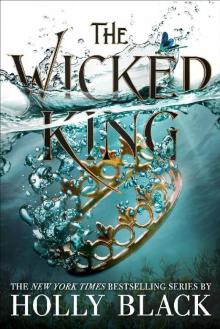 The Wicked King (The Folk of the Air #2)
The Wicked King (The Folk of the Air #2)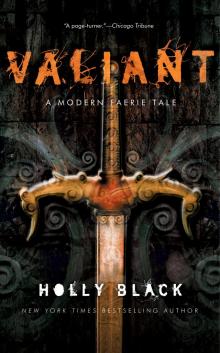 Valiant
Valiant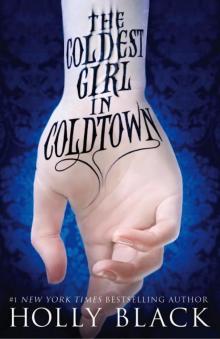 The Coldest Girl in Coldtown
The Coldest Girl in Coldtown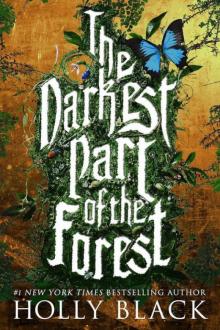 The Darkest Part of the Forest
The Darkest Part of the Forest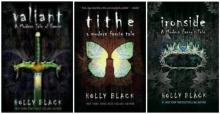 Tithe
Tithe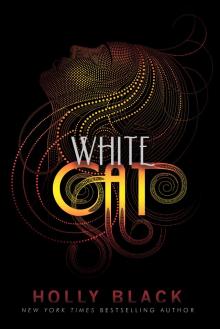 White Cat
White Cat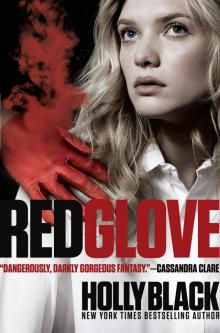 Red Glove
Red Glove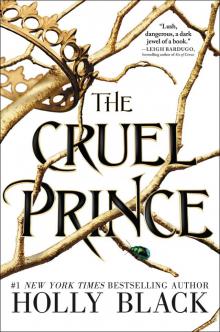 The Cruel Prince
The Cruel Prince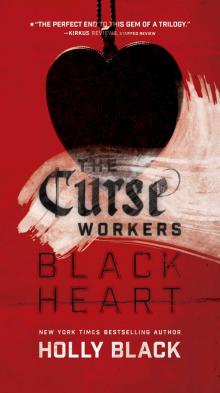 Black Heart
Black Heart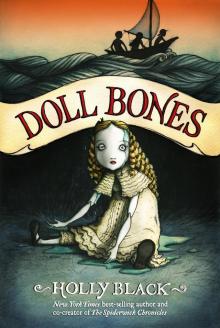 Doll Bones
Doll Bones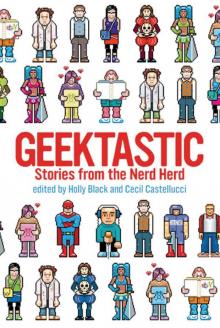 Geektastic: Stories from the Nerd Herd
Geektastic: Stories from the Nerd Herd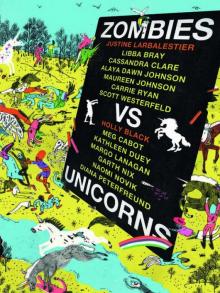 Zombies Vs. Unicorns
Zombies Vs. Unicorns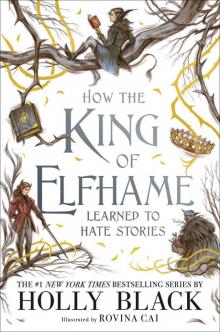 How the King of Elfhame Learned to Hate Stories
How the King of Elfhame Learned to Hate Stories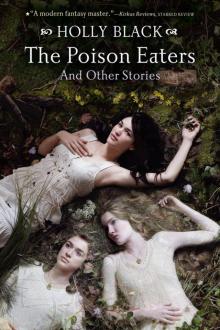 The Poison Eaters and Other Stories
The Poison Eaters and Other Stories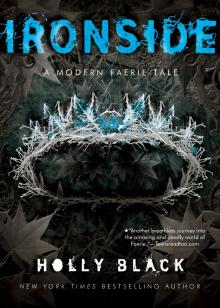 Ironside
Ironside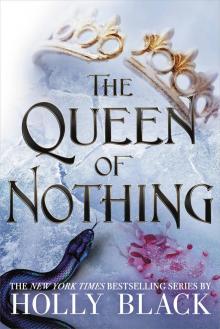 The Queen of Nothing
The Queen of Nothing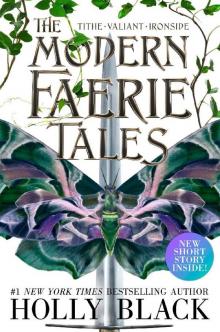 Modern Faerie Tales
Modern Faerie Tales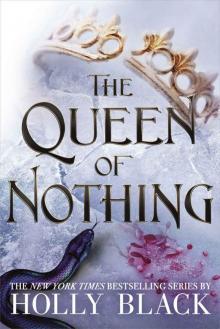 The Queen of Nothing (The Folk of the Air #3)
The Queen of Nothing (The Folk of the Air #3)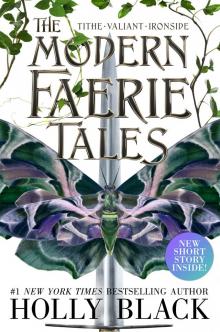 The Modern Faerie Tales
The Modern Faerie Tales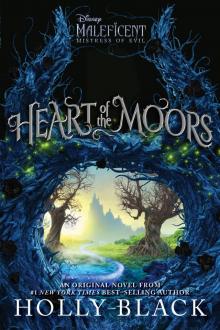 Heart of the Moors
Heart of the Moors The Golden Tower
The Golden Tower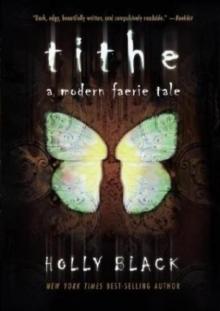 Tithe mtof-1
Tithe mtof-1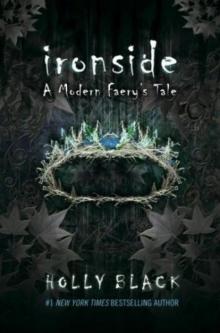 Ironside mtof-3
Ironside mtof-3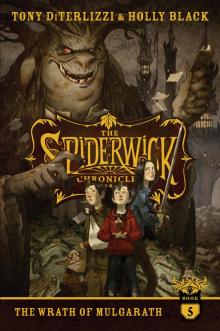 The Wrath of Mulgarath
The Wrath of Mulgarath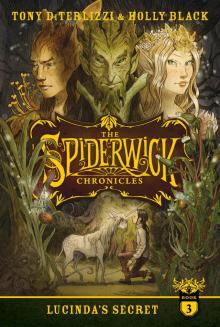 Lucinda's Secret
Lucinda's Secret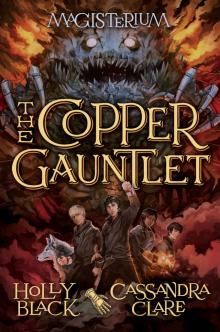 The Copper Gauntlet
The Copper Gauntlet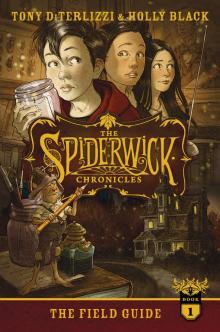 The Field Guide
The Field Guide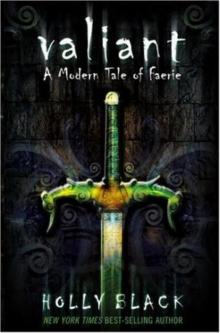 Valiant mtof-2
Valiant mtof-2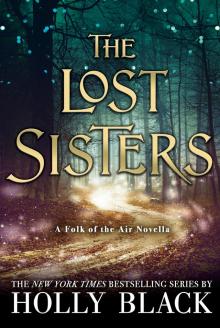 The Lost Sisters
The Lost Sisters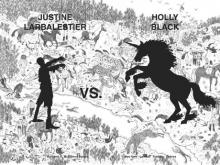 Zombies vs. Unicorns
Zombies vs. Unicorns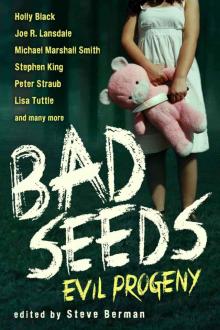 Bad Seeds: Evil Progeny
Bad Seeds: Evil Progeny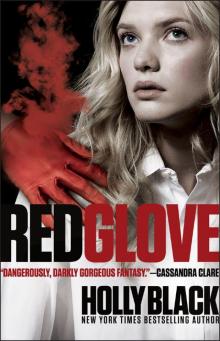 Red Glove (2)
Red Glove (2)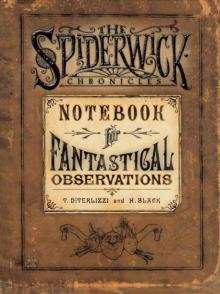 Notebook for Fantastical Observations
Notebook for Fantastical Observations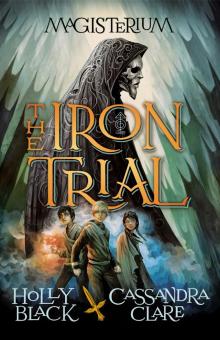 The Iron Trial
The Iron Trial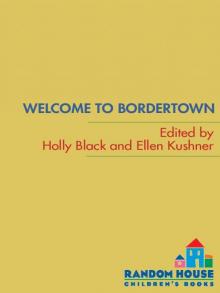 Welcome to Bordertown
Welcome to Bordertown